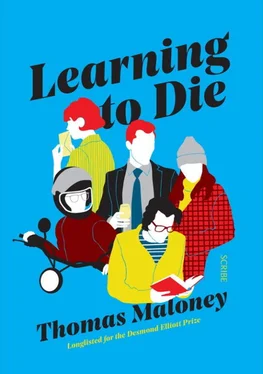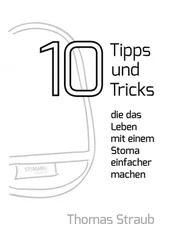At the start of April, a quick hand up — from Natalie, a colleague or a fellow commuter — was sufficient to get Dan out of a chair. By the end of the month, it’s not. Simply standing his body upright is a precarious operation, as it might be for a badly-made action figure. After his fourth fall, from which he is unable to get himself up, Natalie persuades him to try the wheelchair. Within a week, months earlier than he expected, it’s his new reality. Ramps now his domain, stairs of mere sculptural interest with no practical function. Working from home less a leisurely treat, more a prison sentence.
And it’s not just Dan’s legs. His hands still work but he can’t lift his arms above his head: shirts, yes; T-shirts, no. Shirt buttons: annoying. His voice has started to change, which is a bad sign. Its pitch has crept up a couple of notes, and it slurs when he’s tired.
His parents think he and Nat should move house. They look at property websites, tick the ‘accessible’ box and send suggestions. But the two-up-two-down has its advantages: downstairs bathroom; central location; sunny front room where Dan sets up his workstation; gloomy back room a natural bedroom; plenty of space for guests upstairs. Best of all, the wheelchair neatly clears the kink in the hall by one centimetre, which gives Dan, tongue clamped in teeth as he manoeuvres, the thrill of unlikely success every time.
The car becomes a dreaded battleground of heaving and grappling, suddenly swept aside by the arrival of the Motability car in mid-May. You just drive straight into the back, like a drone docking in the mothership. As gadgets go, it’s good.
These arrangements, foresighted concessions to practical needs, are similar, Dan imagines, to the preparations of expectant parents (Nat hasn’t mentioned that idea for a while, thankfully). He too is expectant. Just like the nervous, excited dad-to-be that wasn’t-to-be, he sometimes forgets what is going to happen despite the glaring parade of reminders. Each time reality bites, he feels an incursion of raw panic, incoherent antithesis of all his careful philosophy. The panic is that he doesn’t even know what is unfinished, what unexplored in his dwindling life. He tells himself to get a grip.
Life is preparation.
Six weeks after his thoughtless betrayal (like all thoughtless errors, James’ visit acquired this identity only after the fact), Mike Vickers has failed to re-establish meaningful contact with his sister. He has, apparently, driven Brenda to the other side of the world — to cheery, self-satisfied brother Austin and his New South Wales sheep station.
Faithless brother is a heavy charge to add to Mike’s lengthening roster of worthlessness and wasted privilege, which swells and flexes under the awful magnifying glass of Dan’s illness. However, like all early-stage addicts, Mike is blind to the connections between his various woes — in particular, he’s not prepared to give up James. He likes James. His moment of madness in Ira McFooley’s gallery was both in spite of, and inspired by James. And he doesn’t want James on his conscience as well.
Mike is still spending, cycling grimly between restraint and profligacy. His friends have quickly come to expect and rely on his largesse, and when news of his latest extravagance fails to elicit the enthusiastic affirmation he craves, Mike finds himself calling James.
‘I’ve just signed a rental agreement,’ he announces.
‘For what?’
‘For a summerhouse. On an island in the river — Shepperton. River frontage. Punt. Hot tub. Cocktail bar. Baby grand. For the whole month of June.’
‘I didn’t know you played the piano.’
‘I don’t. But I can punt like a pro.’
‘Sounds idyllic,’ says James, dully. Mike falters for a moment, then presses on.
‘I hope so, because during the week, it’s yours. Your retreat. Sun-dappled, river-rounded change of scene. What can you write in four weeks? Two or three short stories? An avant-garde novella? Gatsby-on-Thames?’
‘Very generous of you, but no thanks.’
‘At the very least come to my garden party there on the ninth.’ James emits a savage snort of laughter that makes Mike wince. It hurts, and it feels good.
‘What on earth are we celebrating?’ asks James.
Natalie Mock’s outward life is locked in a downward dance with Dan’s. When he can no longer safely drive, Natalie can no longer not drive. When he can no longer stand at the kitchen counter, Natalie is committed to all the cooking and all the washing up. When he needs a shower enclosure, she loses a bath. One of the heaviest visible burdens stems from her resolve to spare him the banalities of terminal illness — navigating the bewildering web of well-meaning professionals and volunteers with their leaflets and ring binders, addressing perverse financial complications and, above all, filling in forms. Even three-score and ten is far too short a span to be filling in forms, Natalie reasons, so Dan’s precious few months or years will be form-free if she can help it. In consequence, her downward-dancing outward life has a triple helping of infuriating, bureaucratic crap.
Her internal life is following a stranger, richer course. Each practical necessity has its attendant love-angel — patient, indomitable, ennobling, recalling helpless ministerings to her father but fledged now, matured, drawing out the very best of her once-doubtful respecting and cherishing of Dan. On the other hand, angel or no, each must be accomplished amid the pitch and roll of wretchedness.
Last night, she and Dan argued. ‘I get it!’ she snapped. ‘I get that our future was a blank fucking page that means nothing to you. But this is not only about what might or might not have been, it’s about what’s happening right now — this long, dismal, slow motion goodbye.’
Dan nodded, as he might at a seminar, and replied, in that calm, matter-of-fact voice that makes her want to shake him, ‘A sudden death piles all its sorrow onto those left behind. At least a slow-motion goodbye is shared.’
‘That’s just it!’ she returned. ‘You’re not letting me share it! Sharing it does not mean me turning into your fucking nurse.’ She cried and said sorry, and he said sorry, and it ended.
The little plastic wand lies thoughtfully on the rim of the sink, considering its answer. Natalie’s periods never exhibited much of a sense of rhythm in the bygone era before she went on the pill, so a missed beat need not be significant. But if. She recalls Dan’s three reasons — the three tragedies he wants to avoid: his, hers, and its. He said, ‘There is no divine decree tying you to me.’ It was well-meant, presumably — it might even be true — but could anything be more hurtful?
She tries to stop herself looking down too early. Looks over at the new enclosure. Pictures the old bath, and herself, last year, lying in a marinade of diluted blood. Reaches back, elbow crooked, to feel the dint of the scar.
Her eyes snap down to the edge of the sink. One bar, clear and solitary as her own deluded plot. She feels a crashing wave of relief — only relief. If. If nothing. Not built for babies.
James F. Saunders remembers the Upstart suggesting that the first impulse after a humiliation is to look into a mirror. As for the Exile, his private prescription was simple: Write it! What else are you good for? The foundations of a novel cannot, he feels sure, be laid from unsorted rubble, nor from the still-hot, gelatinous matter of raw feeling. But poetry, perhaps. Yes, it is as poems, or fragments of poems, or poems of fragments, that James’ benighted thoughts stagger back into the light.
The conjunction of several minor observations, each insignificant in itself, convinces him that the Bay locals have become less friendly. Rob’s been dishing the dirt on him. Nobody in Bay much likes Rob, but the dirt sticks anyway. It’s bank holiday weekend, but the Bay Hotel doesn’t have any bar work for him. All very fitting. Sackcloth and ashes, tar and feathers, grime and banishment. Write it.
Читать дальше












